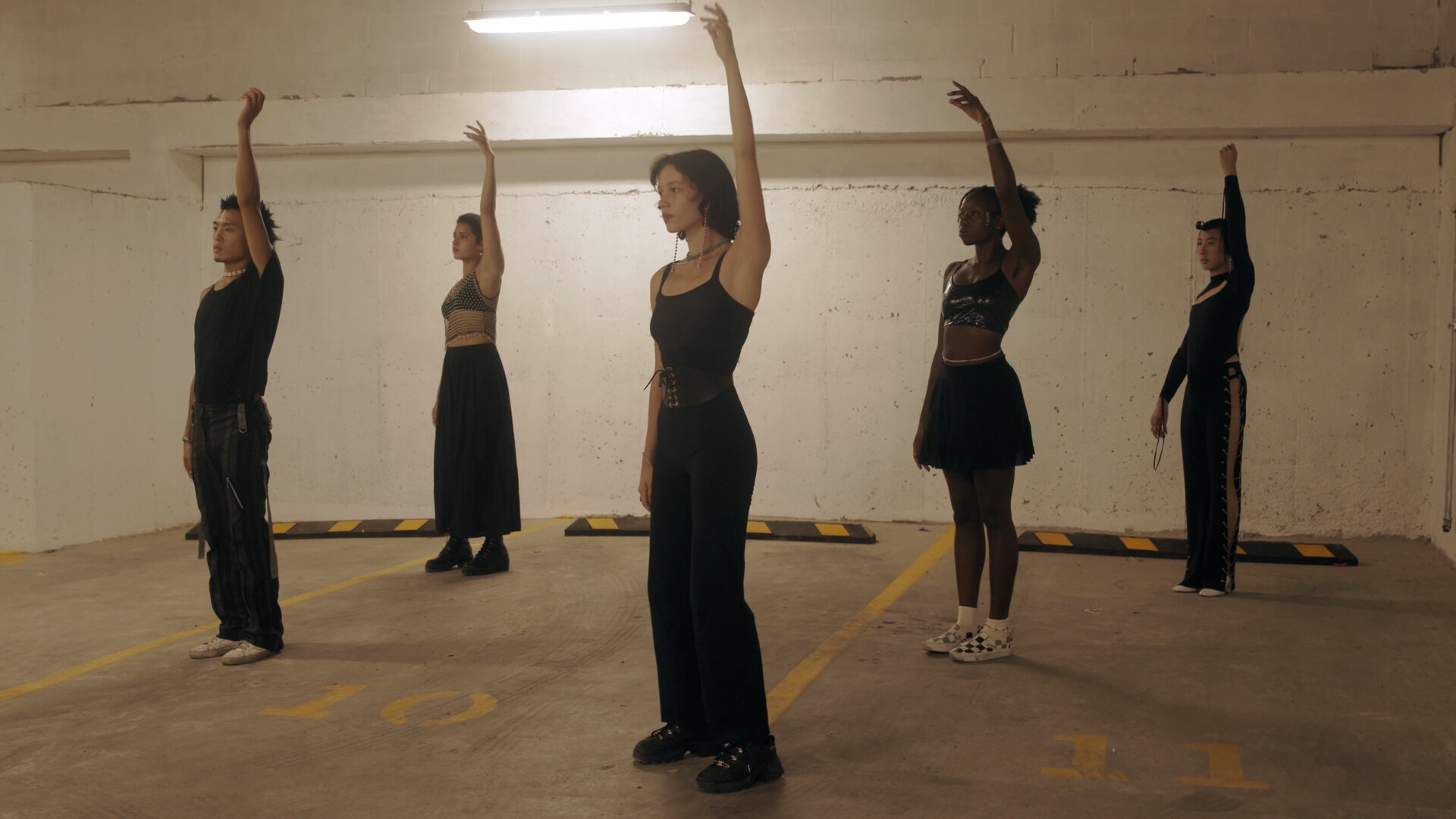FILMMAKERS TO KNOW: JOYCE KEOKHAM
JOYCE KEOKHAM
Joyce Keokham is a writer and filmmaker based in NYC. As an intersectional storyteller, Joyce’s work primarily focuses on empowering underrepresented groups and shedding light on the complexities in identity often ignored by mainstream media. Their latest project, WYA WYD offers a fresh new perspective on the NYC hustle through a vibrant array of characters.
Photo: Alvina Bokhari
SHEER: Tell us a little bit about yourself and where you're from.
JOYCE KEOKHAM: I’m a writer/filmmaker who never thought I’d be one. My parents are real impressive when it comes to resisting westernization so they never enforced the idea of college. They’re more like why would you pay for school when you already have a job making pizza?
They didn't care for the american education system—and good for them because it turns out it's a scam anyways—but when I was young I bought into it. I knew I'd have to take out student loans no matter where I went, I figured let me do this right, let me live somewhere far away. These resources are only going to be offered to me once right? Why not go to school in france? I stole my mom’s social security number to get my student loans then I kinda just kept going. What’s la saying? And what about new york?
Everywhere I went I discovered how comfortably people were living. It was a big Wait. People live like this? And everywhere? moment for me. I didn’t know these people were really real but once I did I started to unravel the notion of abstraction. When you’re struggling and everyone around you is struggling... and the only people you see who aren’t are the people on tv, it doesn’t feel real. Going away and learning that people own properties, have inheritances, buy their ways into schools and pretty commonly, I was in disbelief!
I had to learn they weren’t kidding or being creative when they make mainstream movies and tv shows. They’re actually depicting other people’s realities. As my environment started shifting I realized the same in reverse. When you’re living comfortably and everyone else around you is comfortable and you don’t see people struggling anywhere: not in your schools, not in your neighborhoods, not on tv (at least not in a loveable sitcom kind of way). You don’t realize that it is actually someone else’s reality.
Here I was sharing intimate space with people from the opposite end of circumstances routinely and they still couldn’t get me. Or my experiences. They couldn’t even relate to having student loans! Then I realized they need a reference! So here I am. Making references for the worlds that others need aid in perceiving.
SHEER: In what ways do you believe your culture and upbringing influence your work?
JK: Entirely! My father's family came here as refugees from “the secret war” in Laos. My mom fled Hong Kong because she was fed up with androcentrism at home. Ultimately I wouldn't have had the experiences I have as an american if they didn't go through the experiences which led them here first.
My parents also came from nothing and I grew up watching them make the impossible happen, over and over. I’m sure I benefit from having their work ethic as an example.
SHEER: What does being an "intersectional storyteller" mean to you?
JK: ‘intersectionality' was coined by Kimberlé Crenshaw back in 1989. It’s necessary language and theory which describes the ways in which our social and political identities (ie. race, class, gender, sexuality, et.al) intersect with one another and overlap in consequences of discrimination and privilege.
As a storyteller, our inherent duty is to interrogate the experiences which surround us. If I'm witnessing systems of oppression, I refuse to perpetuate it. Instead let’s point it out and question what we accept as normal. Why should we accept continued portrayals of injustice? Who are we empowering? Are those the stories I want to consume? Are those the stories I want to tell? A large part about observing intersectionality is to also note that I’m not equipped to discuss every struggle because not every struggle is mine. It's also critical for me to work with teams that resemble the narratives we’re trying to tell. If the people around me don't reflect or relate to the story in front of the camera then maybe it isn't our story to tell.
SHEER: How do you approach picking the subjects and themes of your work?
JK: It’s kind of my way of journaling. I write about the people around me, the conversations that strike me and most importantly how it all makes me feel. The diary entries I feel like sharing evolve into my body of work.
SHEER: What did you enjoy the most about working on Keekai's music video for "Show Me"? What drew you to the project initially?
JK: I love sharing what my life looks like now! Keekai is a really close friend of mine, someone who I see every day. He also introduced me to my partner and now the three of us can be a little inseparable. The Show Me video essentially embodies everything we try to foster in our relationships. It’s a reminder that communication extends beyond verbal language. How else can you demonstrate your care for someone? The more avenues we use for expression the less room there is for insecurities. It was fun to explore that with our friends.
Keekai’s been working on his music privately for the longest. When he finally felt ready to share something with me it was the demo for Show Me. I was so so proud of him! Not only is it a beautiful song but it also marked the start of him owning his artistry! As his friend, I had to celebrate that with him.
SHEER: How did you develop the idea for WYA WYD and what were some of the challenges and successes in executing the vision?
JK: One night I was catching up with old coworkers and they thought everything I told them was so ridiculous and funny. As friends do, they said I should have my own show. I’m sure they didn’t mean it seriously but when I got home I sat down and wrote it. I was envisioning what that show might look like and it quickly became WYA WYD.
The hardest part for me was to not be shy about it. I had to confess to everyone that I wanted to make a show inspired by my uneventful-to-me life and then really be about it. The first major success that gave me my momentum was getting Andrew Yuyi Truong to read the script. I’d been following him on IG and loved everything he put out. If I could have chosen any cinematographer to work with, it would have been him! I held my breath and sent him the script.
I couldn’t believe he liked it and was down to work with me. I think I’m still in shock about that? Everyone else attached to the project is a part of my community in new york. Once Andrew joined the team, it affirmed for me that people can relate to this story outside my bubble!
SHEER: Who or what inspired Jackie's character?
JK: It’s me, I’m Jackie. Before I got into writing/directing, I was acting. But the majority of the roles I would be considered for centered around playing the g*rlfriend of white men and/or fresh off the boat Asians. I couldn’t relate to either. It’s weird that it’s necessary but I wanted to make a show that shows everyone, look!—asian-americans are capable of being seen as americans.
SHEER: Love the way the NYC backdrop and culture play characters of their own in the script for WYA WYD. Was this intentional when you were writing?
JK: Thank you for observing that. I’m not sure if it was in my consciousness to do that—to make nyc our fourth roommate—I was just writing what was true to me at the time. It was nice because while recreating it I didn’t really have to think too hard. A lot of the locations we used were places I frequent and have some sort of connection with.
The coffee shop where WYA WYD–Cooper works at was shot at the coffee shop my real life roommate Cooper worked at. Now’s a good time for me to say: I drew a lot of initial inspiration for the character Cooper from my irl Cooper but this one character deviated a lot and took on new meanings and mannerisms of his own.
For everyone else I tried to cast as authentic as I could. My irl bestie Oniel plays Darius in the show. I wanted one of my past coworkers from my retail job to play the part of Nadia but they weren’t interested in auditioning. My producer Stefany recommended Vita for the role. I met Vita through the show and immediately loved her for it. She was able to interpret Nadia better than I could have imagined. I discovered after that Vita is one of the founders of Cafe Forgot–a popular nyc store.
Little true to life references like that are littered throughout the pilot. I think nyc was bound to be a major influence to the show because it’s a major influence in my life.
SHEER: What advice would you give our fellow creatives of color aspiring to revolutionize the TV & film industries?
JK: My friend Blu has a great saying “BIY DIY—BELIEVE IN YOURSELF, DO IT YOURSELF.”









Photography by Nabila Wirakusumah
NYALLAH is known for blending elements of neo-soul, R&B, hip-hop, and West African rhythms while exploring themes of self-expansion, transformation, and love. With their latest project, R+B, recorded in phases spanning a near-death bike accident and an eye-opening trip to Costa Rica, R+B navigates relationships, desirability, and self-awareness from a black queer perspective. Through enchanting vocals and vulnerable lyrics, NYALLAH reminds us that desirability is not love and our liberation lies in de-centering ourselves and prioritizing collective care.